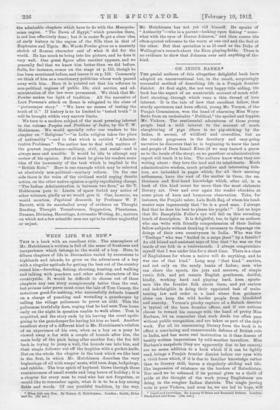WHEN LIFE WAS NEW.*
THIS is a book with an excellent title. The atmosphere of Mr. Hutchinson's writing is full of the sense of freshness and inexperience which belongs to the world of a boy. Here, in fifteen chapters of life in Devonshire varied by excursions to highlands and islands, he gives us the adventures of a boy with a singular aptitude for getting the best out of the country round him—ferreting, fishing, shooting, hunting, and walking and talking with poachers and other able characters of the countryside. It would be difficult to choose out of these chapters any one story conspicuously better than the rest, but primes inter pares must come the tale of Tom Causey, the notorious good-for-nothing, who successfully defends himself on a charge of poaching and wounding a gamekeeper by calling the village policeman to prove an alibi. This the policeman truthfully does, urging that he had seen Tom home early on the night in question unable to walk alone. Tom is acquitted, and the story ends by his leaving the court apolo- gizing to the gamekeeper for having hit him so hard. Another excellent story of a different kind is Mr. Hutchineon's relation of an experience of his own, when as a boy on a pony he viewed away a fox with a couple of hounds after him, the main body of the pack being after another fox ; the fox fell back in trying to jump a wall, the hounds ran into him, and their single follower cut off the trophies with a pocket-knife. But on the whole the chapter in the book which we like best is the first, in which Mr. Hutchinson describes the very beginnings of all with wasps' nests, wild bees, dogs, hedgehogs, and rabbits. The true spirit of boyhood blows through these reminiscences of small events and long hours of holiday ; it is .a chapter for every man to read who has not forgotten, or would like to remember again, what it is to be a boy among fields and woods: Of one youthful tradition, by the way, • When Life was New. By Horace G. Hutchinson. London: Smith, Elder and Co. [6a. net.]
Mr. Hutchinson has not yet rid himself. He speaks of "Authority"—who is a parent—looking upon fishing "some- what with the eyes of Doctor Johnson," and then comes tile often-quoted reference to the worm at one end and the fool at the other. But that quotation is as ill-used as the Duke of Wellington's remark about the Eton playing fields. There hs no evidence to show that Johnson ever said anything of the kind.










































 Previous page
Previous page